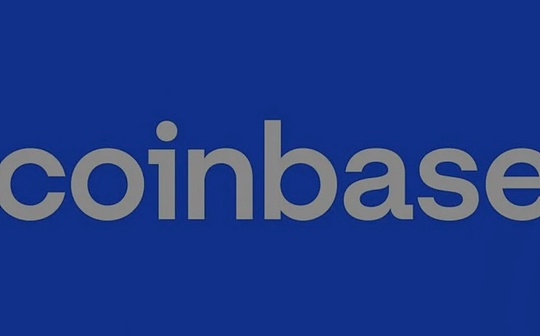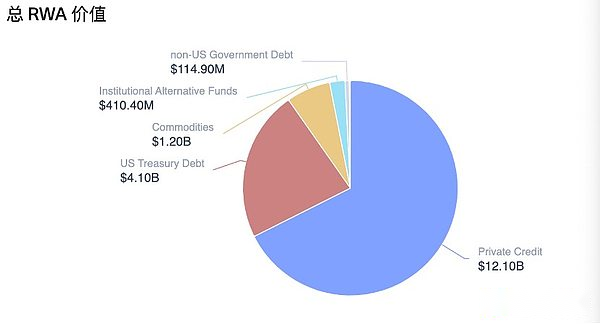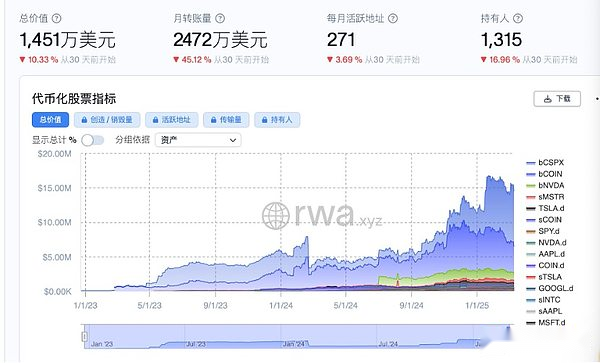
Jessy(@susanliu33), Bitcoin Horizon
Recently, Coinbase CEO Brian Armstrong stated on X that Coinbase is actively exploring the possibility of tokenizing the company’s shares.It is reported that Coinbase has had preliminary communication with the U.S. Securities and Exchange Commission (SEC) and is studying how tokenized stock holders can enjoy the same rights as traditional stock holders.
Coinbase’s move has once again made the tokenization of real world assets (RWA) a hot topic in the crypto market.According to data from RWA.xyz, as of March 2025, excluding stablecoins, the overall market value of global RWA products has reached US$17.93 billion.

According to research by the Boston Consulting Group (BCG), it is expected that the market size of the RWA track will reach 16 trillion US dollars by 2030, far exceeding the current total market value of the entire encryption market.
In addition to stablecoins, in the current RWA track, private credit has the largest market value, U.S. Treasury bonds rank second, and stocks have only a negligible market value.This may be because stock tokenization has been developing slowly since it involves more complex dividend calculation and distribution, as well as regulatory issues.

Nowadays, the trend of compliance of crypto assets is becoming increasingly obvious, especially since Trump took office, the United States has rapidly promoted the development of crypto compliance.Against this background, Coinbase, as the world’s first cryptocurrency exchange listed on Nasdaq, will proactively explore the combination of traditional finance and encryption innovation starting from its own stocks. If successful, it will definitely bring about a greater demonstration effect.
At the same time, in this process, there are many problems that need to be solved, such as supervision, blockchain technology, the internal structure of the company behind the stocks involved, etc.A more important issue is that if the issue of equal rights for currencies and stocks is not resolved, stock tokenization seems to always be a false demand.
Cryptocurrency accelerates compliance, U.S. debt on-chain is hot, and stock on-chain is mentioned again
Traditional finance’s enthusiasm for encryption is increasing year by year, and financial giants such as BlackRock, Fidelity, and JPMorgan Chase have successively launched crypto-asset-related products.In particular, the winding of U.S. Treasury bonds has become the most popular segment on the RWA track in the past two years.
The popularity of treasury bonds on the chain has benefited from the macroeconomics in recent years.Since 2022, the Federal Reserve has raised interest rates multiple times in order to curb high inflation, leading to a tightening of global liquidity.In a high interest rate environment, investors’ risk appetite decreases and traditional financial markets are impacted, resulting in capital tending to flow into low-risk, high-yield asset classes.This has prompted investors to start paying attention to assets such as treasury bonds, gold, and real estate, and the tokenization of these assets has become an important growth point in the RWA track.
Although stock winding has been tried for a long time, it has not gained much popularity in the RWA circuit.Previously, exchanges such as FTX and Binance have launched tokenized trading services and related products for U.S. stocks, but the implementation time has been short. For example, within a few weeks of Binance launching stock tokens in 2021, financial regulatory agencies in the United Kingdom and Germany successively warned that these products may violate securities regulations.In less than three months, Binance announced that it would delist all equity tokens.
From this point of view, compliance is the biggest problem facing stock tokenization.Coinbase’s plan to tokenize its stocks this time was made in the context that the regulation of encryption in the United States will gradually become clearer after the Trump administration came to power.This may be able to avoid the biggest pitfalls encountered by previous people in the practice of stock tokenization.
As the largest compliant exchange in the industry, Coinbase’s entry into the game and tokenizing its stocks will also bring many benefits to itself. First, tokenizing stocks will attract more traditional financial investors into the crypto field, while providing existing crypto investors with new channels to access traditional financial assets. For its direct descendant Base chain, this will also significantly enhance its value and the development of the ecosystem.
For traditional financial markets, stock tokenization can significantly improve transaction settlement efficiency.It will also lower the threshold for retail investors to participate.On the other hand, tokenized stocks can become the basic assets of various innovative financial products, such as automatic dividend distribution and real-time equity registration based on smart contracts, greatly expanding the functional boundaries of traditional securities.
For the encryption industry, the tokenization of stocks by well-known listed companies will promote the entire encryption industry to accelerate the compliance process and establish a more mature regulatory framework and industry standards.Stock tokenization will attract a large amount of traditional financial capital into the crypto market and increase the overall liquidity of the industry.Stock chaining also provides a high-value, large-scale application scenario for blockchain technology.In order to support the tokenization of stocks, the crypto ecosystem will develop more complete custody, settlement, risk management and other services, which will also enhance the professionalism and maturity of the entire industry.
However, in the specific practice of stock listing on the blockchain, although supervision is gradually becoming clearer, there are also many new situations that supervision need to adapt to.The traditional financial regulatory framework needs to be adjusted to adapt to the new situations brought about by stock tokenization, such as increased cross-border transactions, 24/7 trading, etc.
If currencies and stocks cannot have the same rights, the tokenization of stocks will not make much sense.
Stock tokenization is not a new thing. Although it has been practiced for a long time, the market has always been small.According to data from rwa.xyz, the current market value of stocks on the chain is only US$14.51 million. Excluding stablecoins, the overall market value of RWA products is US$17.93 billion.

For stock investors, if these on-chain stocks cannot be traded more conveniently, faster, and more accessible than off-chain stocks, then why buy on-chain stocks?A more practical reason is that it is difficult for holders of these on-chain stocks to enjoy the same rights as holders of physical stocks.
At present, there are no detailed details about how Coinbase will tokenize its stocks, but the on-chain version of its stocks has already been available, but it is not officially launched.On March 8, Backed, a real-life asset tokenization issuer, announced on the X platform that it had launched the tokenized Coinbase stock wbCOIN on the Base network.Users can redeem through CoWSwap, with liquidity coming from Aerodrome.
According to the relevant documents of the product disclosed on its official website, the product was launched as early as 2022 and was deployed on Ethereum at that time.The product was approved by the Liechtenstein Financial Markets Authority (FMA) on May 9, 2022, and by BX Swiss AG on May 23, 2022.However, according to its official news, investors in the tokenized stock will not receive the same dividends as Coinbase stock holders.
According to Coingecko data, the token’s trading volume in the past 24 hours was only $114.It can be seen that this token product has not been recognized by the market.
For investors who hold tokenized stocks, what they are most concerned about is the issue of “equal rights for currency and stock”.
“Equal rights for currency and shares” means that tokenized stocks have exactly the same rights as traditional stocks, including all shareholder rights such as voting rights, dividend rights, and the right to know.In particular, it not only includes the equality of economic rights, but also includes the complete equality of governance rights. Token holders should be able to participate in shareholder meeting voting, receive company notifications, review relevant documents, etc. like traditional shareholders.
If the issue of equal rights for currencies and stocks is not resolved, the value of tokenized stocks will be greatly damaged, and may even be out of touch with traditional stock prices.Backed’s on-chain Coinbase stock product does not seem to have the same rights for coins and stocks, which is also the main reason for its extremely low real trading volume.
The biggest difficulty in achieving equal rights for tokens and shares is still the legal issue. The corporate laws of most countries do not clearly recognize the shareholder status of token holders.On the regulatory front, global trading of tokenized stocks increases the difficulty of regulatory coordination.At the technical level, how to realize the connection between the blockchain system and the traditional shareholder registration and voting system, and the structure of corporate governance also needs to be changed accordingly.
The entry of Coinbase is undoubtedly a good thing for the promotion of equal rights for currencies and stocks.Large institutions have more say in formulating rules together with supervision.We look forward to the realization of the equal rights of currency and stocks under the clarification of supervision. At that time, tokenized stocks will take advantage of more of the advantages of blockchain technology compared to traditional stocks.






